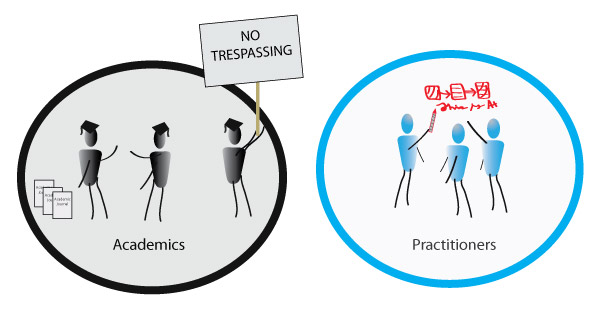Are Academics Just Talking to Themselves?
Last week I was at a writing conference at BYU Idaho and had some interesting thoughts about the academia, as I often do when I'm in a university setting. In one conversation with a faculty member, I mentioned how great it would be to have access to a university library's online journal databases, so that I could find more scholarly material about tech comm outside of the Technical Communication Journal and Intercom, looking in journals such as Technical Communication Quarterly, Business and Technical Communication, Journal of Technical Writing and Communication, Journal of Business Communication, Information Design Journal, some journals in the UK, and so on.
The person I was talking to was in a PhD program. She said it often feels like, given the exclusivity of the academic publications and the disconnect between practitioners and academics, academics are just having a conversation among themselves. In fact, to access a journal's articles, it costs about $30 per article. Full access to the Technical Communications Quarterly archives would cost £187.00. If this is the price for access, I can't imagine many people outside of academia will access the articles.
Tech comm has always been primarily a practical topic, not a subject for study on its own in an ivory tower. With subjects such as philosophy or literature, sure, you can seal their publications in university libraries forever, with the expectation that only other academics will want access. But for a discipline geared towards improving the profession, cloistering up the research makes no sense. The result is a greater disconnect between academics and practitioners.

My criticism assumes that tech comm academics don't do research for the sake of tech comm only, but to advance the practice of tech comm in the workplace. This may be a faulty, myopic requirement based on my practitioner perspective, but it seems that some influence or enhancement of the practice of tech comm is what drives the validity of tech comm research.
I haven't said much about the readability of academic research. Mainly, I find the academic's focus on rhetoric to be one of the great ironies of the academia. Rhetoric, so frequently emphasized in academic settings, is the art of fitting the message to the audience. Supposing the academic's audience is the practitioner, does the way academics deliver their information -- with academic jargon, endless explanations of methodology, and prose that strips out all sense of humanity -- show any principles of rhetoric?
Since academics do understand rhetoric, I can only assume they are crafting their message correctly for their audience. That audience is other academics, not practitioners. However, if this is the case, then you have nothing but an inner circle of self-speak to other academics locked away in classrooms and university offices, too removed from the workplace to understand it, too insular to communicate outside of their lexicon.
I realize that scholarly publications charge for access to pay the costs of designing, printing, and archiving the content. So maybe I'm being unfair in my expectations. In that case, tech comm academics may be victims of academic traditions and culture themselves. To keep their jobs, academics must publish in journals using isolating academic discourse. They must target high-profile, peer reviewed journals that restrict access based on models of exclusivity and budgetary constraints. They can't connect too fully with practical matters of the workplace and still maintain their validity in a traditional university curriculum (otherwise they'll appear to be too vocational). In short, this isn't the same culture as the world wide web.
I get that these realities underlie the academic-practitioner problem. The problem is that tech comm is unlike many other university disciplines in that it is so heavily focused on workplace practice. Yet there couldn't be a larger rift than what exists between tech comm academics and practitioners.
I used to think it would be cool to one day get a PhD in technical communication, but the more I look into academic programs, the less I feel that such an endeavor would have any value. The research I would do? Recycled among academic archives, largely inaccessible from practitioners. Credibility? Mostly lost. Tenure based on influence? What influence? Academic-to-academic influence? How about readability? Only if you speak academese. If that's the end result, what is the value of the tech comm academia? Without the connection to the workplace, research in technical communication lacks purpose.
Despite my railing against academia, I did do a little investigation and found that, with a $50 donation, I can get online access to the online journals that my alma mater subscribes to. So maybe I'm making a mountain out of a molehill. It would be great to see organizations such as the STC provide similar access (beyond the TC Journal), but I doubt there's much of a demand for it. And that's the larger problem -- no demand for the academic journals. There's no demand because the content seems to have little relevance. To be relevant, tech comm academics need to find better ways to connect with practitioners.
About Tom Johnson

I'm an API technical writer based in the Seattle area. On this blog, I write about topics related to technical writing and communication — such as software documentation, API documentation, AI, information architecture, content strategy, writing processes, plain language, tech comm careers, and more. Check out my API documentation course if you're looking for more info about documenting APIs. Or see my posts on AI and AI course section for more on the latest in AI and tech comm.
If you're a technical writer and want to keep on top of the latest trends in the tech comm, be sure to subscribe to email updates below. You can also learn more about me or contact me. Finally, note that the opinions I express on my blog are my own points of view, not that of my employer.

